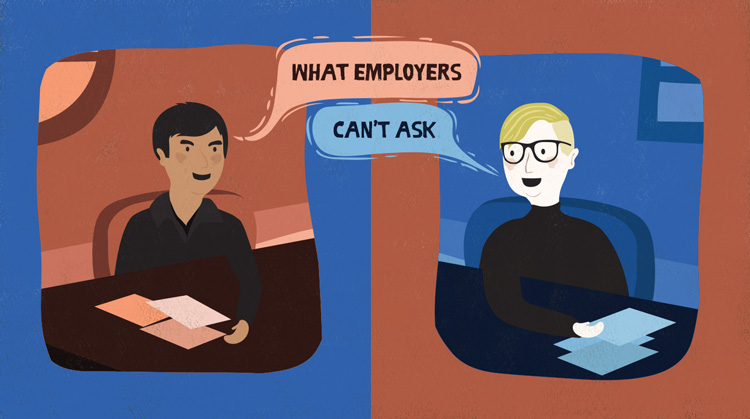Interviewing Skills -
What Employers Can't Ask

Interviewing Skills
What Employers Can't Ask


/en/interviewingskills/to-accept-or-not-accept/content/

Job interviews provide an opportunity for both the employer and the applicant to find out more about each other. Employers often ask questions to learn about your qualifications, skills, and previous jobs. By doing so, they can determine if you're the best fit for the position.
However, there are certain topics employers aren't allowed to ask about. This is because the answers to these questions may lead to illegal discrimination against you, even if the interviewer didn't intend it.
It's important for both interviewers and applicants to know what can and can't be asked during an interview. Instead of asking questions about your personal life, interviewers should instead be focused on your qualifications and skills as they pertain to the job at hand.
Here are several topics that should not be brought up:
While interviewers aren't supposed to ask about your arrest record, they are allowed to bring up your past convictions. If you've been convicted of a crime and it's relevant to the work you're interviewing for, the employer is allowed to use this information when deciding whether to hire you. For more information, review our lesson on Getting a Job with a Criminal Record.
Although employers aren't supposed to bring up the topics mentioned above, they may still end up asking about them during an interview. In some cases, they may not realize they've asked a discriminatory question, while in others it may be intentional. Regardless of the situation, it's important that you know how to respond when faced with one of these questions.
Let's take a look at a scenario where an interviewer might accidentally ask a discriminatory question:

In this example, it seems like the interviewer is trying to make conversation, but this question could lead to discrimination. If you're uncomfortable answering, one way you could respond is by redirecting the question or responding with another question. You could say something like, "It really is a beautiful place, and I loved the time I spent there. Do you travel often?"
You also have the option of simply answering the question. However, before doing this, it's important to remember that your answer could potentially cause the employer to discriminate against you. It's OK to pause before answering the question and consider the best way for you to respond.
Here's a different scenario where an interviewer might intentionally ask a discriminatory question:

A good way to respond to this would be to answer the question's intent without answering the question itself. For example, you could say, "I've never had an issue with getting to work on time, and I can assure you it wouldn't be a problem here." If you can't think of a way to address it, you also have the option of politely asking how the question relates to the job at hand.
If the interviewer asks multiple discriminatory questions or if you feel particularly uncomfortable, you can decline to answer them or even end the interview. You also have the option of filing a charge of employment discrimination with the Equal Employment Opportunity Commission (EEOC). For more information on how to do so, visit the EEOC's website.
/en/interviewingskills/interviewing-skills-quiz/content/